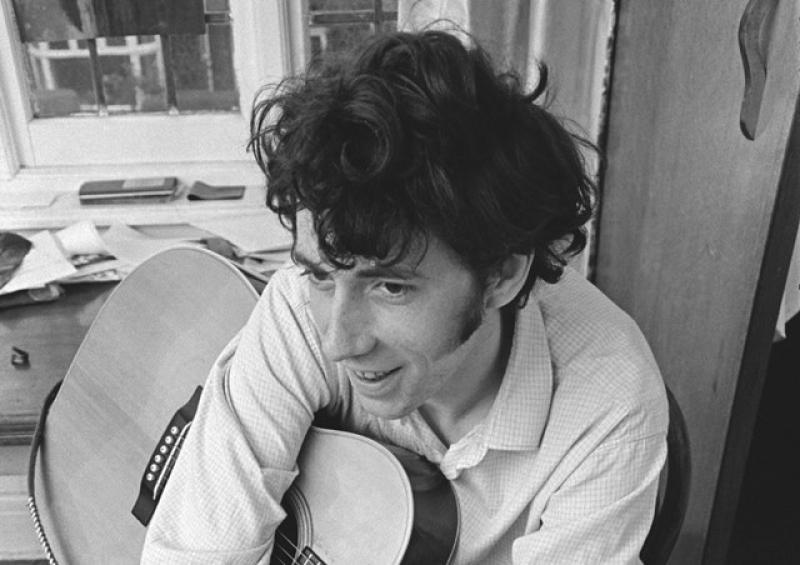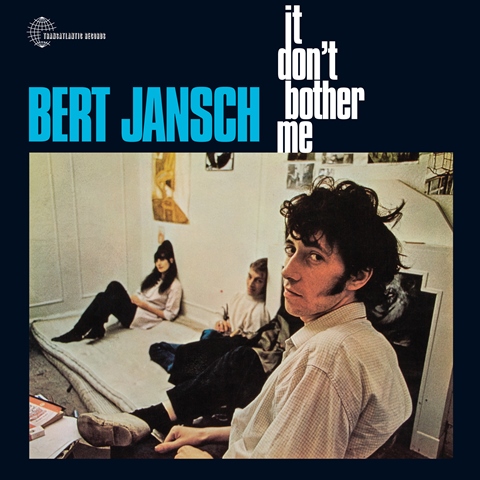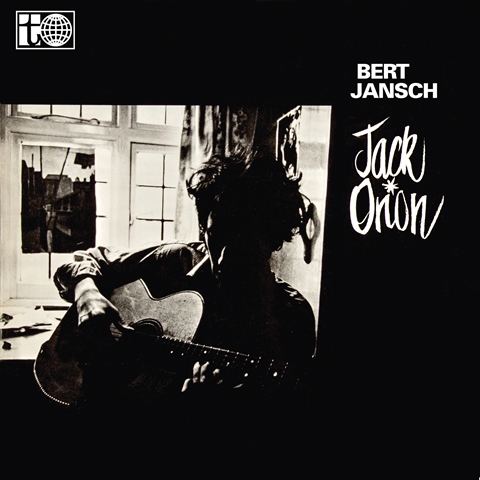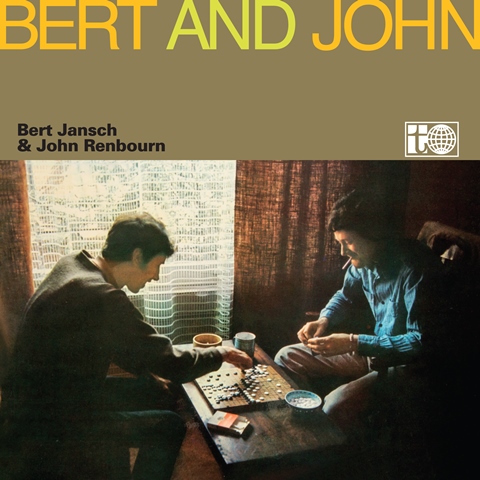Reissue CDs Weekly: Bert Jansch | reviews, news & interviews
Reissue CDs Weekly: Bert Jansch
Reissue CDs Weekly: Bert Jansch
Albums two, three and four reveal different facets of the fast-moving Scots guitar whizz

 Bert Jansch: It Don't Bother Me, Jack Orion / Bert Jansch & John Renbourn: Bert and John
Bert Jansch: It Don't Bother Me, Jack Orion / Bert Jansch & John Renbourn: Bert and John
When theartsdesk last caught up with Bert Jansch, it was April 1965 and he had just issued his eponymous debut album – a set which now, as it was then, is a benchmark take on what acoustic folk and blues would be if a singular, all-embracing vision was applied. As much singer-songwriter album as template for the future of boundary-breaking British folk, Bert Jansch was as influential as it was remarkable.
Jansch did not stand still after April 1965. His follow-up album It Don't Bother Me was released in November 1965. August 1966 saw two albums issued simultaneously: Jack Orion and Bert and John, the latter co-credited with fellow folk explorer John Renbourn. Each new reissue of these albums sounds as great as the edition of Bert Jansch which arrived earlier this year and previous CD editions are rendered obsolete.
Each has insightful, informed liner notes. Those for It Don't Bother Me are by Mick Houghton; Jack Orion’s are by Ken Hunt; Bert and John’s are by John Robinson. The three writers have their own slant on what made Jansch tick, so each essay makes for a compelling, yet slightly different, take on the artist, his milieu and the period. They should be read together. Just as the album sleeves should be seen together: each pictures Jansch at home, in the type of lifestyle self-portrait first seen on the sleeve of Bob Dylan's Bringing It All Back Home. The album sleeves portray him, his music and home as integral to each other.
 The reissue of albums two, three and four from Jansch brings the opportunity to place him in context and understand his musical evolution. Instead of a linear development, there is – as would be expected from albums recorded during so a short period – an approach which is almost scattershot. Like the liner notes, each album represents a particular facet of Jansch.
The reissue of albums two, three and four from Jansch brings the opportunity to place him in context and understand his musical evolution. Instead of a linear development, there is – as would be expected from albums recorded during so a short period – an approach which is almost scattershot. Like the liner notes, each album represents a particular facet of Jansch.
Despite coming so soon after his debut, It Don't Bother Me is the most interesting and satisfying. Jansch had, as Houghton notes, recorded it “a few weeks after Bert Jansch hit the shops [and] he was required to come up with a completely new batch of songs just as his life was changing around him. Jansch had by now put down some roots and was fast becoming the reluctant poster boy for the new generation of young folk guitarists.” It was also his first recording in a proper studio – the debut album had been recorded in the house of his label’s boss.
It Don't Bother Me opens with “Oh My Babe”, a song which clearly feeds into the early Incredible String Band. As the album progresses, Jansch is heard sloughing off his blues influence. The complex instrumental “The Wheel” evinces a flamenco influence. The title track stresses his ambivalence about becoming popular.
 Yet Jansch continued making albums. Jack Orion – which heavily features Renbourn – partially continues the path of his debut album but also, with its duets, points to what would become a template style for roots-inclined bands in the late Sixties and early Seventies. This is also the album integral to Jimmy Page’s vision for Led Zeppelin (“Blackwater Side”, once melded with Davey Graham's and Anne Briggs's separate versions of “She Moved Through the Fair”, became their “White Summer”).
Yet Jansch continued making albums. Jack Orion – which heavily features Renbourn – partially continues the path of his debut album but also, with its duets, points to what would become a template style for roots-inclined bands in the late Sixties and early Seventies. This is also the album integral to Jimmy Page’s vision for Led Zeppelin (“Blackwater Side”, once melded with Davey Graham's and Anne Briggs's separate versions of “She Moved Through the Fair”, became their “White Summer”).
Jack Orion is the acknowledged classic of the three and, with its foundations in and reconfiguration of the traditional, is the most significant of these reissues. Although unspoken, there is a clear acknowledgment of artistic symbiosis with soul mate Anne Briggs. She had been the first to bring “Blackwater Side” to wider attention.
Jansch’s links with his contemporaries were close. He and Renbourn had lived together and, echoing its cover, Bert and John is a window on what they got up to when the doors were closed. More than a snapshot of the two musically feeling each other out or, indeed, a footnote to Jack Orion or Renbourn’s own debut album, Bert and John, as Ken Hunt puts it in his liner note, “is a slim volume, but a powerful one.” There is intensity in the meshing of the two musicians which is not born from competiveness, but a need to push each other further. It’s a tribute to both that the essentials of each composition are not lost: melodies and (pretty) strict arrangements are adhered to and to the fore.
In the end though, It Don't Bother Me, Jack Orion and Bert and John stand or fall on the music. Each is a strong album and each reveals a different aspect of the fast-moving Jansch. Remove one from the story and the others would not make sense. All three have to be heard.
Next week: Carole King’s early band The City
Buy
Explore topics
Share this article
The future of Arts Journalism
You can stop theartsdesk.com closing!
We urgently need financing to survive. Our fundraising drive has thus far raised £49,000 but we need to reach £100,000 or we will be forced to close. Please contribute here: https://gofund.me/c3f6033d
And if you can forward this information to anyone who might assist, we’d be grateful.

Subscribe to theartsdesk.com
Thank you for continuing to read our work on theartsdesk.com. For unlimited access to every article in its entirety, including our archive of more than 15,000 pieces, we're asking for £5 per month or £40 per year. We feel it's a very good deal, and hope you do too.
To take a subscription now simply click here.
And if you're looking for that extra gift for a friend or family member, why not treat them to a theartsdesk.com gift subscription?
more New music
 Music Reissues Weekly: Hawkwind - Hall of the Mountain Grill
Exhaustive box set dedicated to the album which moved forward from the ‘Space Ritual’ era
Music Reissues Weekly: Hawkwind - Hall of the Mountain Grill
Exhaustive box set dedicated to the album which moved forward from the ‘Space Ritual’ era
 'Everybody Scream': Florence + The Machine's brooding sixth album
Hauntingly beautiful, this is a sombre slow burn, shifting steadily through gradients
'Everybody Scream': Florence + The Machine's brooding sixth album
Hauntingly beautiful, this is a sombre slow burn, shifting steadily through gradients
 Cat Burns finds 'How to Be Human' but maybe not her own sound
A charming and distinctive voice stifled by generic production
Cat Burns finds 'How to Be Human' but maybe not her own sound
A charming and distinctive voice stifled by generic production
 Todd Rundgren, London Palladium review - bold, soul-inclined makeover charms and enthrals
The wizard confirms why he is a true star
Todd Rundgren, London Palladium review - bold, soul-inclined makeover charms and enthrals
The wizard confirms why he is a true star
 It’s back to the beginning for the latest Dylan Bootleg
Eight CDs encompass Dylan’s earliest recordings up to his first major-league concert
It’s back to the beginning for the latest Dylan Bootleg
Eight CDs encompass Dylan’s earliest recordings up to his first major-league concert
 Ireland's Hilary Woods casts a hypnotic spell with 'Night CRIÚ'
The former bassist of the grunge-leaning trio JJ72 embraces the spectral
Ireland's Hilary Woods casts a hypnotic spell with 'Night CRIÚ'
The former bassist of the grunge-leaning trio JJ72 embraces the spectral
 Lily Allen's 'West End Girl' offers a bloody, broken view into the wreckage of her marriage
Singer's return after seven years away from music is autofiction in the brutally raw
Lily Allen's 'West End Girl' offers a bloody, broken view into the wreckage of her marriage
Singer's return after seven years away from music is autofiction in the brutally raw
 Music Reissues Weekly: Joe Meek - A Curious Mind
How the maverick Sixties producer’s preoccupations influenced his creations
Music Reissues Weekly: Joe Meek - A Curious Mind
How the maverick Sixties producer’s preoccupations influenced his creations
 Pop Will Eat Itself, O2 Institute, Birmingham review - Poppies are back on patrol
PWEI hit home turf and blow the place up
Pop Will Eat Itself, O2 Institute, Birmingham review - Poppies are back on patrol
PWEI hit home turf and blow the place up
 'Fevereaten' sees gothic punk-metallers Witch Fever revel in atmospheric paganist raging
Second album from heavy-riffing quartet expands sonically on their debut
'Fevereaten' sees gothic punk-metallers Witch Fever revel in atmospheric paganist raging
Second album from heavy-riffing quartet expands sonically on their debut
 theartsdesk Q&A: Soft Cell
Upon the untimely passing of Dave Ball we revisit our September 2018 Soft Cell interview
theartsdesk Q&A: Soft Cell
Upon the untimely passing of Dave Ball we revisit our September 2018 Soft Cell interview
 Demi Lovato's ninth album, 'It's Not That Deep', goes for a frolic on the dancefloor
US pop icon's latest is full of unpretentious pop-club bangers
Demi Lovato's ninth album, 'It's Not That Deep', goes for a frolic on the dancefloor
US pop icon's latest is full of unpretentious pop-club bangers

Add comment